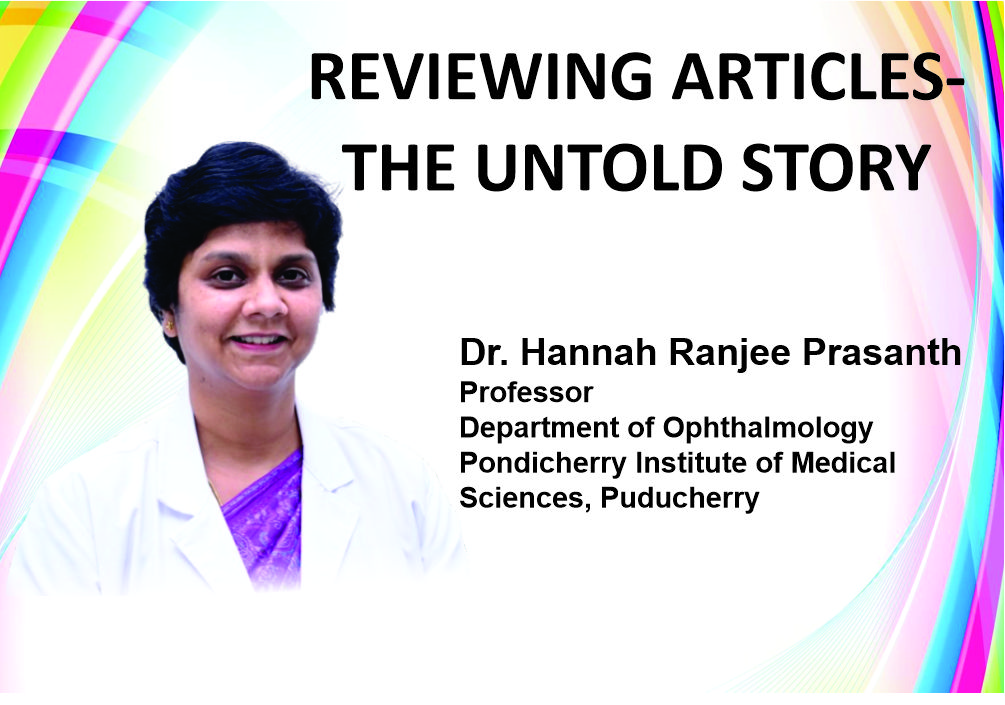I somehow became a reviewer without even realizing it. As Assistant Professor, I had to read through abstracts and articles prepared by post graduate residents for presentation and publication. I carefully read each word, making changes to ensure that the writing was relevant and easy to understand. I went through the tables and statistical analysis meticulously, checking the values added up and p values given. I ensured the discussion gave plausible explanations for the results of the study and compared those results with other recent, relevant studies. I painstakingly read and often rewrote the conclusion to correlate with the aims of that study, highlighting key results and providing possible explanations for these results.
I did not take the work on willingly, it was an added burde , on top of clinical and teaching work, but it had to be done in a teaching institution, so I somehow found the time. It often took a few months to make a manuscript fit for submission to a journal. And this went on for quite a few years.
The Editor in Chief of IJCEO reached out and requested me to review a few articles, I reluctantly agreed, unsure of what it entailed, but eager to help the gentleman who had gone above and beyond to help me, a total stranger, with my publications and thereby my promotion to Professor.
I was pleasantly surprised to find that reviewing an article for a journal was exactly what I had been doing for my postgraduate residents for a long time, the only difference was that I did not know the author!
I would like to share my understanding of the peer review process. We need to first understand and accept that the basis for peer review is trust, all those involved in the review process are expected to behave in an ethical and responsible manner. The public trusts the reviewer to give an unbiased validation of academic work. The experts trust an article which has gone through the peer review process and confidently apply the findings to their own patients. Peer review prevents dissemination of uncertain results, incorrect conclusions or interpretations.
One should agree to review only if one has the necessary expertise. It is our professional responsibility. I strongly feel that those who have benefitted from the process of peer review should consider contributing their expertise.
The ideal reviewer must be a subject expert with objectivity. They should be able to judge the quality of data and the validity of conclusions while assessing the significance of the work. An ideal reviewer will not have any conflicts of interest and will be able to give a good critique of the article. Most importantly, they return the reviews on time.
Set aside a dedicated time for reviewing. It usually requires at least 1 hour to review an article properly. Read the article through in its entirety once, from Introduction to References. Then read it again, studying the data and discussion.
Confidentiality must be maintained. Information gained cannot be used to anyone’s advantage or disadvantage. The outcome and content of the review should also be kept confidential. Do not involve anyone else in the review process. If juniors help, the Editor should be informed and their work duly acknowledged. The reviews should be constructive. Try to be fair and honest while remaining objective and professional.
Usually the reviewers are blinded; unaware of the authors or the institution the article is from. Nowadays, the concept of ‘Open peer review process ‘ is being tried by various journals. Many reviewers refuse to participate as the remarks are made publicly. This can lead to hostility between the reviewer and the authors.
Post publication reviews are increasing with technology and knowledge dissemination. These reviews are written after publication. It may bring out errors which were missed during review. Often , these reviews are open.
Reviewers must work to provide reviews that meet the highest standards of science as well as the highest standards of ethics. Being a reviewer has been a tedious job, but I get much satisfaction from being able to help others in my field get their papers published. I have learnt much, about the publication process and also about my subject. I would even go as far as to say that I am beginning to enjoy it!
Peer review is the cornerstone of publication. It ensures that published research articles are reliable and useful. Reviewers critically assess an

